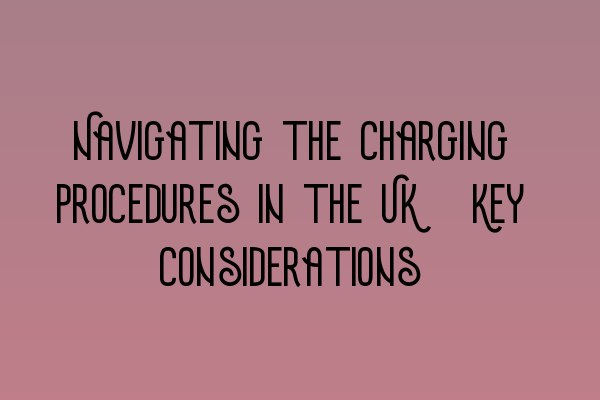Navigating the Charging Procedures in the UK: Key Considerations
When it comes to criminal law in the UK, understanding the charging procedures is crucial. Whether you are an aspiring solicitor or someone who requires legal representation, having a grasp of the charging process can greatly contribute to your legal journey. In this article, we will explore the key considerations when navigating the charging procedures in the UK.
The Initial Arrest
Before we delve into the intricacies of charging procedures, it’s important to touch upon the initial arrest process. When an individual is suspected of committing a crime, they may be arrested by the police. This initial arrest is often the starting point of the charging process. To learn more about the arrest process, check out our article on SQE 1 Practice Exam Questions.
Investigation and Gathering of Evidence
Following the arrest, the police will initiate an investigation to gather evidence to support the charges. This involves conducting interviews, obtaining witness statements, and collecting all relevant information that may contribute to building a strong case. It is during this stage that the Crown Prosecution Service (CPS) comes into play, advising the police on the strength of the evidence. To better understand the investigation process, take a look at our comprehensive article on SQE 1 Practice Mocks FLK1 FLK2.
Charge or No Charge Decision
Once the investigation is complete and sufficient evidence has been gathered, the CPS will make a crucial decision to either charge the individual with a crime or release them without charge. This decision is based on the evidential sufficiency and the public interest test. It’s important to note that the CPS must be satisfied that there is a realistic prospect of conviction before proceeding with a charge. To learn more about the charge or no charge decision, check out our informative article on SQE 2 Preparation Courses.
Types of Charges
There are various types of charges an individual can face in the UK criminal justice system. From minor offenses like theft to more serious crimes such as murder, understanding the different types of charges is essential. Each charge carries different levels of severity and potential penalties. To familiarize yourself with the types of charges, our article on SQE 1 Preparation Courses provides a comprehensive overview.
Court Proceedings and Trial
If an individual is charged with a crime, they will then proceed to court where the formal legal process takes place. The court proceedings involve presenting the evidence to a judge and possibly a jury, who will then determine the individual’s guilt or innocence. Understanding the nuances of court proceedings is crucial to ensure a fair trial. To stay up to date with the latest SRA SQE exam dates and court procedures, check out our article on SRA SQE Exam Dates.
Seek Professional Legal Advice
Navigating the charging procedures in the UK can be complex and overwhelming, especially if you’re not familiar with criminal law. That’s why it’s crucial to seek professional legal advice and representation. Qualified solicitors specializing in criminal law can guide you through the entire process, ensuring your rights are protected and your case is presented effectively. To find an experienced criminal law solicitor, visit our website examplelawfirm.com.
In conclusion, understanding and navigating the charging procedures in the UK is vital for both legal professionals and individuals involved in criminal cases. From the initial arrest to court proceedings, each step plays a crucial role in ensuring a fair and just legal process. By familiarizing yourself with the charging procedures and seeking professional legal advice, you can navigate the complexities of the criminal justice system effectively.
